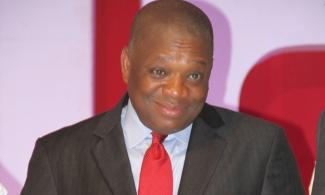
The former Governor, who is also a chieftain of the All Progressives Congress (APC) earlier told the court through his counsel, Professor Awal Kalu (SAN), that he was ready to open his defence. However, he recanted himself when the ruling was not favourable.

Orji Uzor Kalu, former Governor of Abia State, on Friday sought an adjournment after Justice Mohammed Idris ruled on his application that he should not be cross-examined by the Economic and Financial Crimes Commission (EFCC) after his evidence in court.
The former Governor, who is also a chieftain of the All Progressives Congress (APC) earlier told the court through his counsel, Professor Awal Kalu (SAN), that he was ready to open his defence. However, he recanted himself when the ruling was not favourable.
The judge had ruled: “I have listened to the submission of both defendants and that of the prosecution, the law is settled that a defendant is at liberty to choose the more of his evidence in court, however there are two options open to such defendant.
“1. To give statement where he is sitting without entering witness box and cross-examination continues, is not required
2. To enter the witness box to give evidence and be cross-examined.[story_link align="left"]62744[/story_link]
“However at this junction, I need to emphasise that a statement is different from evidence and weight attached to them are different, a defendant can either swim or sink with his decisions, which will reflect in my judgement. I will say no more.”
Kalu's lawyer, Awa Kalu (SAN), had at the resumed hearing of the matter on Friday indicated the readiness of his client to open his defence from outside the box, contrary to the EFCC's insistence that Kalu would be cross-examined while giving evidence-in-chief.
The Senior Advocate added that the former governor would not be open to cross-examination by the prosecution in line with the dictates of Section 358 (1) (a) of the Administration of Criminal Justice Act (ACJA) 2015.
He said his request was predicated on the fundamental principle of criminal law for all defendants anchoring on presumption of innocence.
“Section 358 (1) (a) is not a donation from the court to the first defendant but a statutory provision. A man who can refuse to talk can also refuse to be cross-examined,” he said.
“Once a defendant charged with a criminal offence opts to testify from where he is, he is only exercising his rights that flow from the Constitution. The first defendant carries no burden but it is the prosecution that is carrying the burden of prove beyond reasonable doubt.”
Other defence lawyers, Chief Solo Akuma (SAN) and Mr. K. C. Nwofor (SAN), were in support of the position.
However, in his opposition, EFCC's lawyer, Rotimi Jacobs (SAN) said the ACJA does not regulate evidence in court.
He further argued that since the first defendant (Kalu) was represented by a legal practitioner in court, he cannot take advantage of the options available for him in Section 358 of ACJA.
“The examination of the witness must be in accordance with the Evidence Act because it regulates how proceedings should go on in court. If a witness is not cross-examined, his evidence cannot be used in court,” he said.
However, in a bench ruling, Justice Idris held that the first defendant was absolutely at liberty to choose from any of the options available under Section 358 of ACJA.
Justice Idris further disclosed that the options in the Section were available to the first defendant whether or not he had legal representation.
After citing the provisions of Section 358 of ACJA, the judge said: “In the circumstances of this case, where a defendant chooses the options under Section 358 (a) of ACJA as the first defendant has done in this case, the first defendant is not given evidence.
“Making a statement is different from giving evidence. A person who gives evidence from the witness box after been sworn-in can also make a statement from wherever he stands. Both options are available to the defendant in any criminal trial.
“If the first defendant has decided to make a statement only, then he will not be cross-examined. He will only be cross-examined where he chooses to give evidence.”
After the ruling, Kalu's lawyer sought an adjournment for him to decide on the best option to be adopted by his client in putting forward his case.
Though the EFCC's lawyer was initially opposed to the request, he later agreed after some talks with the defence lawyers.